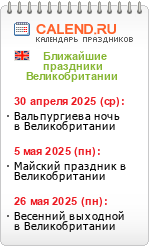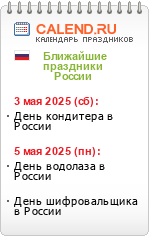Maslenitsa
Maslenitsa (Russian: Ма́сленица, Ukrainian: Ма́сляниця, Belarusian: Ма́сьленіца), also known as Butter Week, Pancake week, or Cheesefare Week, is a Russian religious and folk holiday. It is celebrated during the last week before Great Lent—that is, the seventh week before Pasha (Easter). Maslenitsa corresponds to the Western Christian Carnival, except that Orthodox Lent begins on a Monday instead of a Wednesday. The Orthodox date of Easter can differ greatly from the Western Christian date. In 2008, for example, Maslenitsa was celebrated from March 2 to March 8.
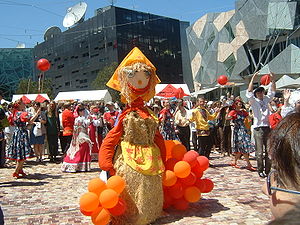
Maslenitsa has a dual ancestry: pagan and Christian. In Slavic mythology, Maslenitsa is a sun festival, celebrating the imminent end of the winter.
On the Christian side, Maslenitsa is the last week before the onset of Great Lent. During Maslenitsa week, meat is already forbidden to Orthodox Christians, making it a myasopustnaya nedelya (Russian: мясопустная неделя, English "meat-empty week" or "meat-fast week"). It is the last week during which milk, cheese and other dairy products are permitted, leading to its other name of "Cheese-fare week" or "Butter week". During Lent, meat, fish, dairy products and eggs are forbidden. Furthermore, Lent also excludes parties, secular music, dancing and other distractions from the spiritual life. Thus, Maslenitsa represents the last chance to partake of dairy products and those social activities that are not appropriate during the more prayerful, sober and introspective Lenten season.
Russia Day
 Russia Day (Russian: День России, Den Rossii) is the national holiday of the Russian Federation, celebrated on June 12. It has been celebrated every year since 1992. The First Congress of People's Deputies of the Russian Federation adopted the Declaration of State Sovereignty of the Russian Soviet Federative Socialist Republic on June 12, 1990. History The idea of the declaration was born in the Democratic Russia movement, in which proponents of evolutionary market reform and strong statehood based on Russia's national interests started opposing the Communist monopoly on power.
Russia Day (Russian: День России, Den Rossii) is the national holiday of the Russian Federation, celebrated on June 12. It has been celebrated every year since 1992. The First Congress of People's Deputies of the Russian Federation adopted the Declaration of State Sovereignty of the Russian Soviet Federative Socialist Republic on June 12, 1990. History The idea of the declaration was born in the Democratic Russia movement, in which proponents of evolutionary market reform and strong statehood based on Russia's national interests started opposing the Communist monopoly on power. In addition, by the late 1980s, society had begun to doubt the Politburo's ability to carry out meaningful socio-economic reforms. The creation of the post of the President of the Russian Federation and the adoption of the new Russian Constitution to reflect the new political reality, along with the national flag, anthem and emblem of the Russian Federation, were major landmarks in the consolidation of Russian statehood.
The country's new name- the Russian Federation (Russia)- was adopted on December 25, 1991. The day when the declaration was adopted- June 12 - was proclaimed as national holiday by Supreme Soviet of Russia in 1992, and again proclaimed Russia's national holiday by the Russian President's decree of June 2, 1994. Under the presidential decree of June 16, 1998, it was called the Day of Russia. In 2002, the new Labor Code gave official seal to this title.
International Women's Day
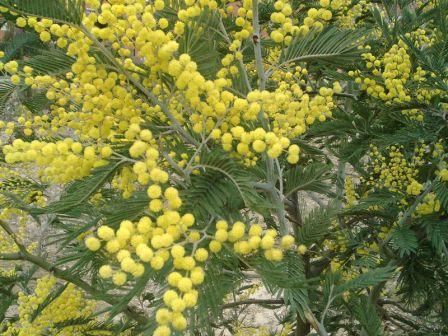 International Women's Day (IWD), originally called International Working Women’s Day, is marked on March 8 every year. Nowadays this is a major day of global celebration of women. In different regions the focus of the celebrations ranges from general celebration of respect, appreciation and love towards women to a celebration for women's economic, political and social achievements. Started as a Socialist political event, the holiday blended in the culture of many countries, primarily Eastern Europe, Russia, and the former Soviet bloc.
International Women's Day (IWD), originally called International Working Women’s Day, is marked on March 8 every year. Nowadays this is a major day of global celebration of women. In different regions the focus of the celebrations ranges from general celebration of respect, appreciation and love towards women to a celebration for women's economic, political and social achievements. Started as a Socialist political event, the holiday blended in the culture of many countries, primarily Eastern Europe, Russia, and the former Soviet bloc. In many regions, the day lost its political flavour, and became simply an occasion for men to express their love for women in a way somewhat similar to a mixture of Mother's Day and St Valentine's Day. In other regions, however, the original political and human rights theme designated by the United Nations runs strong, and political and social awareness of the struggles of women worldwide are brought out and examined in a hopeful manner.
The mimosa (technically, the Silver Wattle) is the symbol of the celebrations of Women's day in Italy and Russia.
Tatiana Day
Tatiana Day (Russian: Татьянин день, Tatyanin den' ) is a Russian religious holiday observed on January 25 according to the Gregorian calendar, January 12 according to the Julian. It is named after Saint Tatiana, a Christian martyr in 3rd century Rome during the reign of Emperor Alexander Severus.
In 1755 on the name day of Ivan Shuvalov's mother Tatiana Rodionovna, his mistress Empress Elizabeth of Russia endorsed his petition to establish a university in Moscow. The church of Saint Tatiana was later built in the university campus, the Russian Orthodox Church declared Saint Tatiana the patron saint of students, and Tatiana Day has become celebrated as Russian Students Day.
Victory Day
The Soviet Victory Day or 9 May marks the capitulation of Nazi Germany to the Soviet Union in the Second World War (also known as the Great Patriotic War in the Soviet Union and some post-Soviet states). It was first inaugurated in the fifteen republics of the Soviet Union, following the signing of the surrender document late in the evening on 8 May 1945 (9 May by Moscow Time). It happened after the original capitulation that Germany earlier agreed to the joint Allied forces of the Western Front. The Soviet government announced the victory early on 9 May after the signing ceremony in Berlin. Though the official inauguration happened in 1945 (which means it has been celebrated since 1946), the holiday became a non-labour day only in 1965 and only in some of the countries.
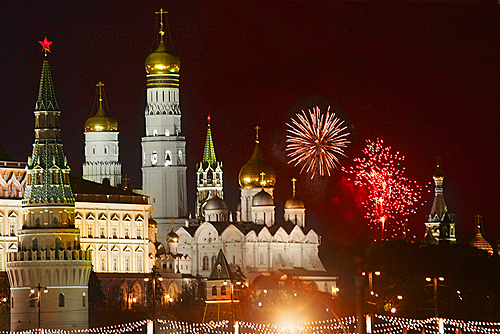 In communist East Germany, a Soviet-style "Victory Day" on 9 May was an official holiday from 1975 until the end of the republic in 1990. Prior to that, "Liberation Day" was celebrated on 8 May, between 1950 and 1966, and again on the 40th anniversary in 1985. Since 2002, the German state of Mecklenburg-Vorpommern has observed a commemoration day known as the "Day of Liberation from National Socialism, and the End of the Second World War".
In communist East Germany, a Soviet-style "Victory Day" on 9 May was an official holiday from 1975 until the end of the republic in 1990. Prior to that, "Liberation Day" was celebrated on 8 May, between 1950 and 1966, and again on the 40th anniversary in 1985. Since 2002, the German state of Mecklenburg-Vorpommern has observed a commemoration day known as the "Day of Liberation from National Socialism, and the End of the Second World War". In 1988,just before the collapse of the Soviet Union, Victory Day ceased to be observed in Uzbekistan, but was partially restored in 1999 as Memorial/Remembrance Day.After their separation from the Soviet Union, the Baltic countries now commemorate the end of WWII on 8 May, the Victory in Europe Day.
New Year's Eve
New Year's Eve is observed on December 31, the final day of the Gregorian calendar, the day before New Year's Day. New Year's Eve is a separate observance from the observance of New Year's Day. In modern practice, fireworks, music, other forms of noisemaking, and alcoholic beverages are common elements of the New Year's Eve celebration.
New Year's Eve is often celebrated with parties and social gatherings spanning the transition of the year at midnight.
New Year
 New Year - January 1: New Year's Day is one the most favorite holidays in Russia. Both grown-ups and children are happy on this day. n the Eve of this holiday or just on this very day everybody give presents to each other, have fun, make fireworks, decorate pine and fur-trees, cook delicious things and lay the holiday table. The unchangeable participants of this holiday are Farther Frost and his granddaughter "Snegurochka"(a snow girl). The holiday lasts till next morning. Everyone who believes in good says an intimate wish and thanks God for everything good that had happened that year. For the first time this holiday was announced by Peter 1 's order dated by January 20, 700. This order gave the detailed instructions how to celebrate New Year's Day. Many people used to see the New Year in on January 14, (according to the old calendar). And the tradition of telling fortunes at this night is very popular among young ladies and fellows, who is willing to know at least a little bit about their near future.
New Year - January 1: New Year's Day is one the most favorite holidays in Russia. Both grown-ups and children are happy on this day. n the Eve of this holiday or just on this very day everybody give presents to each other, have fun, make fireworks, decorate pine and fur-trees, cook delicious things and lay the holiday table. The unchangeable participants of this holiday are Farther Frost and his granddaughter "Snegurochka"(a snow girl). The holiday lasts till next morning. Everyone who believes in good says an intimate wish and thanks God for everything good that had happened that year. For the first time this holiday was announced by Peter 1 's order dated by January 20, 700. This order gave the detailed instructions how to celebrate New Year's Day. Many people used to see the New Year in on January 14, (according to the old calendar). And the tradition of telling fortunes at this night is very popular among young ladies and fellows, who is willing to know at least a little bit about their near future. Christmas
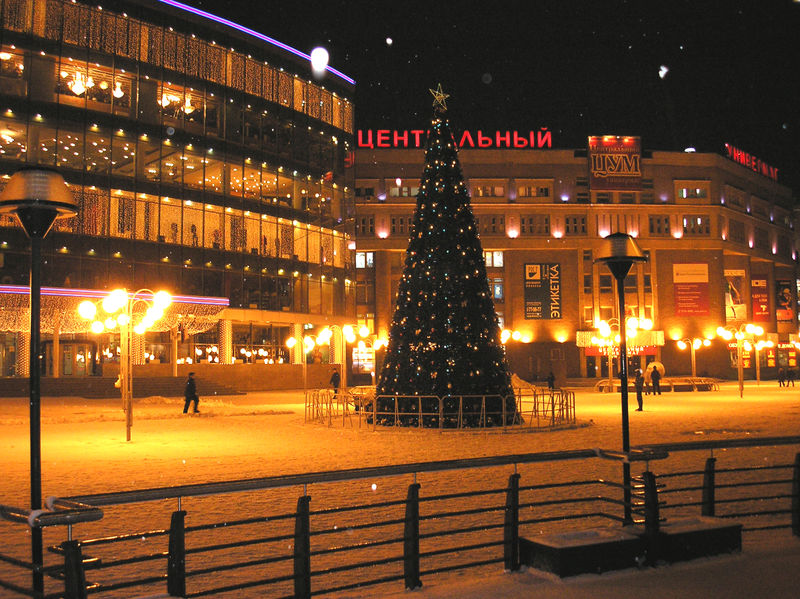 Orthodox Christmas - January 7: This period from 7 till 19th of January is the best period for telling fortunes, as it is the Saint Christmas week, when people have fun, ware fancy-dresses and walk from one home to another asking for favor.
Orthodox Christmas - January 7: This period from 7 till 19th of January is the best period for telling fortunes, as it is the Saint Christmas week, when people have fun, ware fancy-dresses and walk from one home to another asking for favor. In the night of the 7th of January (according to the orthodox calendar) is Christmas. In Christmas holidays people try to be better, purer (cleaner); it is the time when Christian values take peculiar importance (meaning), it is time for good deeds. Christmas-is the holiday of waiting for miracles. As once it had happened in Vifliem - the Rescuer of humanity was born, so it must happen every year on this day. That's why both grown-ups and children are waiting for Christmas with such impatience and even though miracle doesn't take place the holiday is very nice with its unique mixture of folk and Christian customs and tradition.
Old New Year
Old New Year - January 13: holiday in memory of Old Calendar New Year. Celebarated as a family holiday.
Easter
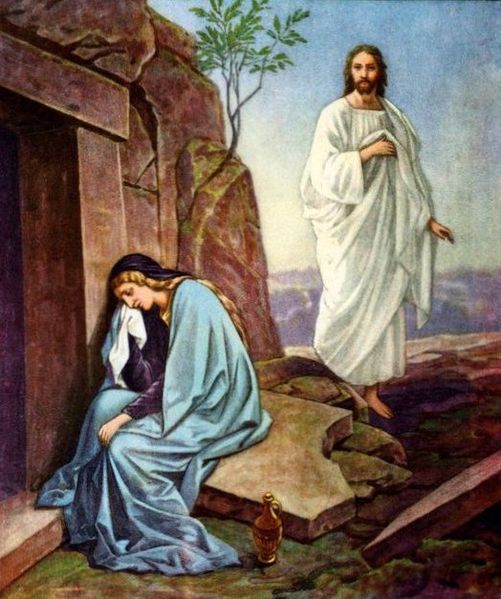 Orthodox Easter - two weeks after Catholic Easter: It is the main Christian holyday established in honor to the Resurrection of Jesus Christ crucified on the cross and to the Outcome of the Jews from Egypt.
Orthodox Easter - two weeks after Catholic Easter: It is the main Christian holyday established in honor to the Resurrection of Jesus Christ crucified on the cross and to the Outcome of the Jews from Egypt. Easter is hold on the 1st Sunday after the vernal equinox and it is celebrated solemnly and merrilly. The date of Easter is usually determined by the church calendar and calculate according to so-called paskhalias - the special tables.
Defender of the Fatherland Day
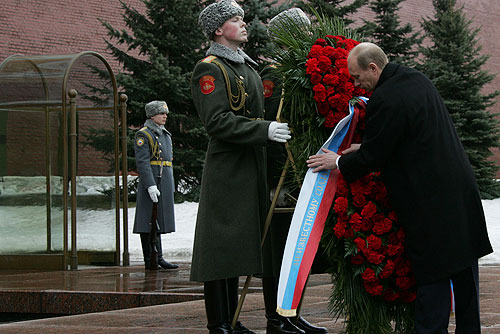 On 23 February, during the Defender of the Fatherland Day (День защитника Отечества Den zashchitnika Otechestva) Russia honors those who are presently serving in the Armed Forces and those who have served in the past. During the era of the Soviet Union, it was called the Red Army Day or the Day of the Soviet Army and Navy (celebrating the day of the first mass draft of the
On 23 February, during the Defender of the Fatherland Day (День защитника Отечества Den zashchitnika Otechestva) Russia honors those who are presently serving in the Armed Forces and those who have served in the past. During the era of the Soviet Union, it was called the Red Army Day or the Day of the Soviet Army and Navy (celebrating the day of the first mass draft of the Red Army in Petrograd and Moscow or of the first combat action against the invading German forces).
The holiday is celebrated with parades and processions in honor of veterans, and women also give small gifts to the Russian men in their lives, especially husbands (or boyfriends), fathers and sons. As a part of the workplace culture, women often give gifts to their male co-workers. Consequently, in colloquial usage, the holiday is often referred to as Men's Day
Kupala Day
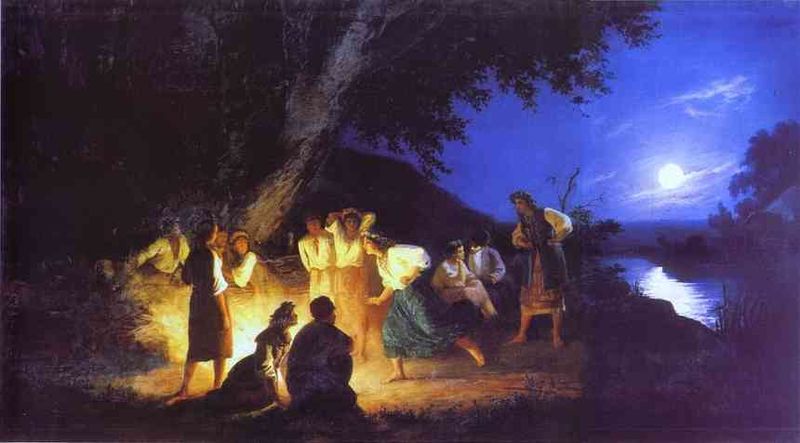 Kupala Day (Feast of St. John the Baptist; Russian: Иван-Купала; Belarusian: Купалле; Ukrainian: Іван Купала; Polish: Noc Kupały or Noc Świętojańska) is celebrated in Poland, Russia, Belarus and Ukraine currently on the night of 6/7 July in the Gregorian or New Style calendar, which is 23/24 June in the Julian or Old Style calendar still used by many Orthodox Churches. Calendar-wise, it is opposite to the winter solstice holiday Korochun. The celebration relates to the summer solstice when nights are the shortest.
Kupala Day (Feast of St. John the Baptist; Russian: Иван-Купала; Belarusian: Купалле; Ukrainian: Іван Купала; Polish: Noc Kupały or Noc Świętojańska) is celebrated in Poland, Russia, Belarus and Ukraine currently on the night of 6/7 July in the Gregorian or New Style calendar, which is 23/24 June in the Julian or Old Style calendar still used by many Orthodox Churches. Calendar-wise, it is opposite to the winter solstice holiday Korochun. The celebration relates to the summer solstice when nights are the shortest. Some early mythology scholars, such as Sir James Frazer, claimed that the holiday was originally Kupala; a pagan fertility rite later accepted into the Orthodox Christian calendar. There are analogues for celebrating the legacy of St. John around the time of the summer solstice elsewhere, including St. John's Day in Western Europe.
The Russian name of this holiday combines "Ivan", Russian for the name John (the Baptist), and Kupala which is related to a word derived from the Slavic word for bathing, which is cognate. The latter is reinterpreted as John's baptizing people through full immersion in water (therefore his biblical title of the Baptist). However, the tradition of Kupala predates Christianity, due to correlation to a pre-Christian Slavic god or goddess. Due to the popularity of the pagan celebration that with time it was simply accepted and reestablished as one of the native Christian traditions intertwined with local folklore. On rare occasions it is spelled as Ivanna Kupala (Joann) representing the tradition as feminine.
The holiday is still enthusiastically celebrated by the younger people of the Eastern Europe. The night preceding the holiday (Tvorila night) is considered the night for "good humour" mischiefs (which sometimes would raise concerns of law enforcement agencies). On Ivan Kupala day itself, children are engaged in water fights and perform pranks mostly involving pouring water over someone.
The International Day of Children Defendence
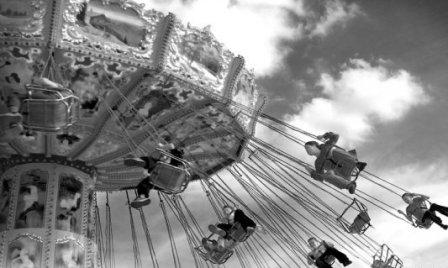 The Internatioal Day of Children Defendence - June 1: What is sunnier, joyful, and memorable than the childhood? A child gets to know the world, learns good and friendship, finds out new in familiar things. A child is happy when he is loved, warmed fed and understood. The children are the future of the mankind. Tomorrow is in their hands. Their right for life and dignity must be respected and defended.
The Internatioal Day of Children Defendence - June 1: What is sunnier, joyful, and memorable than the childhood? A child gets to know the world, learns good and friendship, finds out new in familiar things. A child is happy when he is loved, warmed fed and understood. The children are the future of the mankind. Tomorrow is in their hands. Their right for life and dignity must be respected and defended. Trinity is the unity of three God's faces: God Father, God Son and Sacred Spirit. It is a Chritian holyday. It is celebrated on the 50th day after Easter hence it follows its another name-Pyatidesyatnitsa (the 50th day).
On this day Holy Spirit went down on the Apostles and gave them Christ's instructions to spread news of Christianity to all the peoples and languages. This holiday is hold according to folk rites.
The dwellings are decorated with twigs of birch. People remember the deceased. In the evening people sing and dance in rings. In Russia Whitsunday merged with the Semic holiday. It is the esteem of plant Spirits. People also celebrate the Parents' Saturday.
Teacher's Day
Teacher's Day - October 5: This special day was created to focus the World's attention on the contributions and achievements of teachers as well as their concerns and priorities.
The Day of laughter
Recently this fun holiday didn't celebrate everywhere but nowadays it has become a custom. Everybody tries to play a trick on others.
May 1
 The Holiday of Spring and Labor - May 1: The 1st of May is the traditional holiday of spring. It opens the sequence of other May holidays. This is the day of triumph of the nature which is full of blossom, of birds' singing, of multicolored flowers and small balls. People have a rest both from the long frosty winter and winter troubles looking forward the summer and summer joys.
The Holiday of Spring and Labor - May 1: The 1st of May is the traditional holiday of spring. It opens the sequence of other May holidays. This is the day of triumph of the nature which is full of blossom, of birds' singing, of multicolored flowers and small balls. People have a rest both from the long frosty winter and winter troubles looking forward the summer and summer joys.














